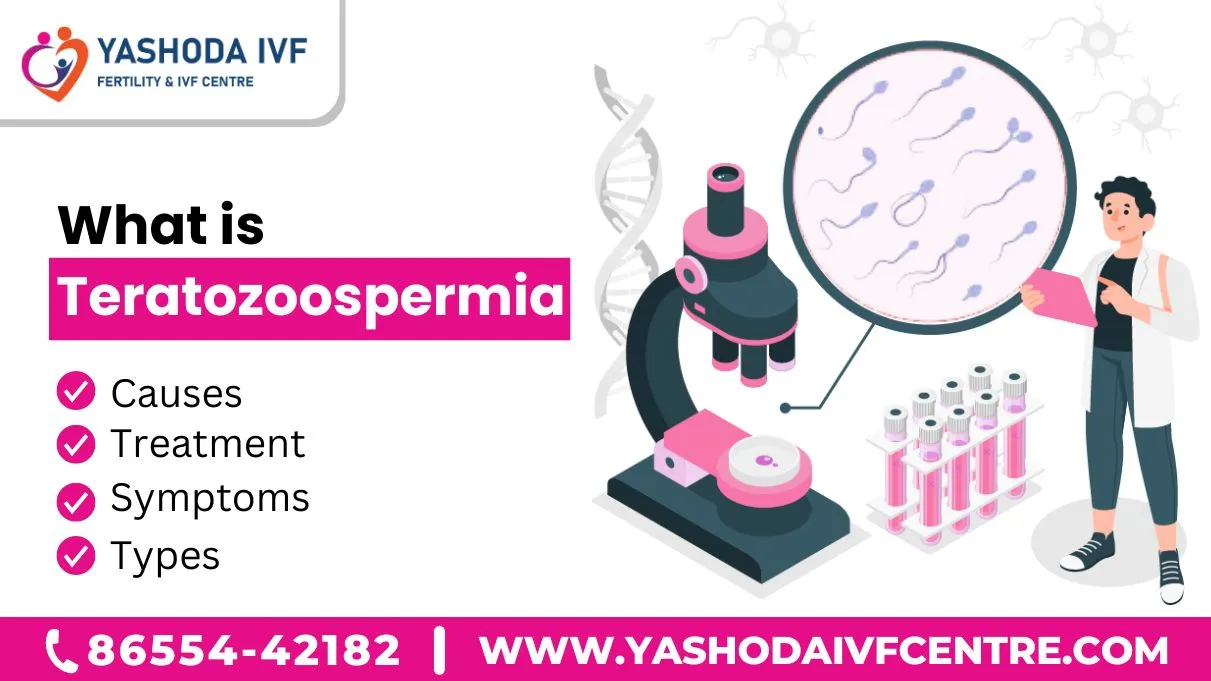What is Teratozoospermia: Causes, Symptomps and Treatments

Introduction to Teratozoospermia
Teratozoospermia, also called Teratospermia, is a condition that affects how sperm look. Sperm are tiny cells that help in making babies. If too many sperm are oddly shaped or not formed correctly, it can be hard for them to meet and join with the egg inside a woman’s body. In Simple words Teratozoospermia is when a man has a high number of abnormally shaped sperm. If more than 96% of the sperm in a sample are abnormal, it’s diagnosed as teratozoospermia, which can lead to fertility problems.
What is Teratozoospermia?
When a man’s sperm are not formed correctly, it’s called Teratozoospermia. The World Health Organization (WHO) says that if less than 4% of a man’s sperm look normal, he has Teratozoospermia. A man’s sperm can have different types of defects in the head, middle, or tail. Normal sperm have:
- An oval head
- A single, long tail
- A middle section that is slightly thicker than the tail
When the sperm do not have these characteristics, it can be difficult for them to swim properly and reach the egg, or even if they do reach the egg, they might not be able to fertilize it.
Types of Teratozoospermia
Teratozoospermia can be mild, moderate, or severe, based on how many normal sperm are present:
- Mild Teratozoospermia: At this point, 10–14% of the sperm are healthy. Men can still become pregnant naturally even if they have mild teratozoospermia.
- Moderate Teratozoospermia: This is when 5-9% of the sperm are normal. Men with moderate Teratozoospermia might need fertility treatments like IVF (In vitro fertilization) or ICSI (Intracytoplasmic Sperm Injection).
- Severe Teratozoospermia: This is when less than 5% of the sperm are normal. Men with severe Teratozoospermia usually need treatments like ICSI or IMSI (Intracytoplasmic Morphologically-selected Sperm Injection) to have a baby.
There are also specific types of teratozoospermia based on the abnormalities in the sperm:
- Astheno Teratozoospermia: Low sperm movement combined with abnormal sperm shapes results in this disease. This means that the sperm do not move well and are also misshapen, making it very hard for them to fertilize an egg naturally.
- Oligo Astheno Teratozoospermia: This condition combines abnormal sperm shapes, low motility, and a low sperm count. This means that there are fewer sperm, and those that are present are both misshapen and have difficulty moving.
Teratozoospermia can happen for many reasons. Here are some common causes:
Testicle Problems: Infections or injuries in the testicles can affect how sperm are made.
Varicocele: Swelling in the veins of the scrotum can affect sperm quality.
Smoking and Drinking: Smoking and drinking too much alcohol can harm sperm.
Poor Diet: Not eating healthy foods can affect sperm quality.
Drug Use: Using drugs like cocaine or marijuana can affect sperm.
Diabetes: This condition can affect sperm.
Radiation and Chemotherapy: Treatments for cancer can affect sperm.
High Temperatures: Spending too much time in saunas, hot tubs, or wearing tight clothes can increase the temperature of the testicles and affect sperm.
Genetic Factors: Sometimes, problems with sperm shape can be passed down from parents to children.
Obesity: Being very overweight can also affect sperm quality.
In some cases, it’s a combination of these factors that leads to teratozoospermia. For example, a man might have a genetic predisposition to poor sperm quality, which is made worse by smoking and a poor diet.
To find out if a man has Teratozoospermia, doctors do a test called a semen analysis. This test checks the shape, size, and number of sperm in a sample. The doctor looks at the sperm under a microscope to see if they are normal or not.
During the test, the doctor will look for sperm with:
- Oval heads
- Long, straight tails
- Properly sized middle sections
If too many of the sperm do not have these characteristics, the man may be diagnosed with teratozoospermia.
Even though Teratozoospermia can make it hard to have a baby, there are treatments that can help:
Lifestyle Changes: Men with mild Teratozoospermia can improve their sperm quality by making healthier choices. This includes:
Eating healthy foods rich in vitamins and antioxidants.
Exercising regularly.
Quitting smoking and drinking alcohol.
Avoiding drugs.
Reducing stress through activities like yoga and meditation.
Nutritional Supplements: Taking supplements like Vitamin E, omega-3 fatty acids, and L-carnitine can help improve sperm quality.
Fertility Treatments: For men with moderate to severe Teratozoospermia, doctors may suggest fertility treatments like:
IUI (Intrauterine Insemination): Sperm is placed directly into the woman’s uterus to help fertilize the egg.
IVF (In vitro fertilization): Eggs and sperm are combined outside the body, and then the fertilized egg is placed in the woman’s uterus.
ICSI (Intracytoplasmic Sperm Injection): A single sperm is injected directly into an egg to help with fertilization.
IMSI (Intracytoplasmic Morphologically-selected Sperm Injection): This is a more advanced version of ICSI where the sperm is selected using a microscope for better results.
Types of Sperm Abnormalities in Teratozoospermia
Sperm can have different types of abnormalities:
- Astheno Teratozoospermia: This is when most sperm have both abnormal shapes and low motility (they don’t move well). Men with this condition usually need treatments like ICSI or IMSI.
- Oligo Astheno Teratozoospermia: This is when most sperm have abnormal shapes, low motility, and a low sperm count. Men with this condition also need treatments like IMSI.
Men can improve their sperm quality naturally by making healthy choices:
Eat Healthy Foods: Foods rich in antioxidants, vitamins, and minerals help improve sperm quality. Foods like fruits, vegetables, nuts, and fish are good choices.
Exercise Regularly: Staying active and maintaining a healthy weight can improve sperm quality.
Avoid Smoking and Alcohol: Quitting smoking and reducing alcohol intake can improve sperm quality.
Reduce Stress: Activities like yoga, meditation, and spending time in nature can help reduce stress and improve sperm quality.
Get Enough Sleep: A good night’s sleep is essential for overall health and can also improve sperm quality.
- Stay Hydrated: Drinking plenty of water helps keep the body healthy and can improve sperm production.
When natural methods are not enough, assisted reproductive technologies (ARTs) can help couples achieve pregnancy. These include:
IUI (Intrauterine Insemination): This procedure places sperm directly into the woman’s uterus during ovulation, increasing the chances of fertilization.
IVF (In vitro fertilization): In this process, eggs are retrieved from the woman’s ovaries and fertilized with sperm in a lab. After fertilization, the egg (embryo) is placed inside the woman’s uterus
ICSI (Intracytoplasmic Sperm Injection): A single sperm is injected directly into an egg. This is especially useful when the sperm have trouble penetrating the egg on their own.
- IMSI (Intracytoplasmic Morphologically-selected Sperm Injection): This advanced technique uses a high-powered microscope to select the best sperm for injection into the egg, increasing the chances of a successful pregnancy.
The Effect of Teratozoospermia on Embryos
Studies show that sperm with abnormal shapes can lead to problems in the developing embryo’s chromosomes. This can cause conditions where the embryo has too few or too many chromosomes. To prevent this, fertility doctors carefully select the best sperm for treatments like ICSI or IMSI.
Lifestyle Changes to Improve Sperm Quality
Making lifestyle changes can significantly improve sperm quality. Here are some tips:
Healthy Diet: Eating a balanced diet with plenty of fruits, vegetables, and lean proteins can improve sperm quality.
Regular Exercise: Regular physical activity helps maintain a healthy weight and reduces stress.
Quit Smoking: Smoking can harm sperm. Quitting smoking can improve sperm quality.
Limit Alcohol: Reducing alcohol consumption can improve overall health and sperm quality.
Avoid Drugs: Drugs like marijuana and cocaine can affect sperm quality. Avoiding these substances can help.
Manage Stress: Sperm production can be impacted by stress. Stress management techniques like yoga and meditation can be useful.
Stay Hydrated: Drinking plenty of water helps keep the body healthy and can improve sperm production.
Get Enough Sleep: A good night’s sleep is essential for overall health and can also improve sperm quality.
Avoid High Temperatures: Keeping the testicles cool can help. Avoid saunas, hot tubs, and tight clothing.
The Role of Supplements in Improving Sperm Quality
Certain supplements can help improve sperm quality:
Vitamin E: An antioxidant that helps protect sperm from damage.
Omega-3 Fatty Acids: Found in fish oil, these help improve sperm motility and morphology.
L-carnitine: An amino acid that helps increase sperm count and motility.
Zinc: Important for sperm production and hormone regulation.
Folic Acid: Helps improve sperm count and quality.
- Coenzyme Q10: An antioxidant that improves sperm motility.
If you suspect you have teratozoospermia, it’s important to consult a fertility specialist. They can conduct tests and recommend treatments to help improve your chances of having a baby. A fertility specialist can provide personalized advice and support, helping you navigate the best options for your situation. One of the best places to seek help is the Yashoda IVF and Fertility Centre in Navi Mumbai.
Conclusion
Teratozoospermia can make it hard for a couple to have a baby, but with the right treatments and lifestyle changes, it is possible to improve sperm quality and achieve pregnancy. If you or someone you know is facing this condition, it is important to consult a fertility doctor to discuss the best treatment options. Understanding teratozoospermia and taking proactive steps to improve sperm quality can make a significant difference. Whether through lifestyle changes, nutritional supplements, or assisted reproductive technologies, there are many ways to address this condition and increase the chances of a successful pregnancy. For the best care and support, consider visiting Yashoda IVF and Fertility Centre in Vashi, where you can find expert guidance and advanced treatment options tailored to your needs.
FAQ: Teratozoospermia and Infertility
Share on social media :
Recent Posts
Contact Us Today
Book Your Free Consultation Now

